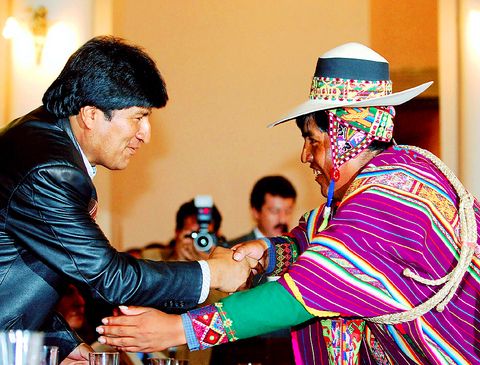Bolivian President Evo Morales signed into law a sweeping agrarian reform bill that distributes land to the poor but threatens to spark violence with government opponents.
Hundreds of indigenous Bolivians danced and cheered outside the presidential palace early yesterday celebrating the move.
Morales signed the law in a publicly ceremony just before midnight Tuesday, only minutes after it was passed by the Senate.

PHOTO: EPA
Large landowners in the eastern Agricultural regions of Santa Cruz, Beni and Pando strongly opposed the new law, which grants the government power to seize land deemed unproductive.
Eight civic groups representing powerful eastern Bolivian interests threatened a regional strike starting yesterday if pro-government measures, including land reform, were approved.
Supporters of Morales and the eastern regional groups have clashed violently in the past, most recently on Monday.
Speaking yesterday to supporters, Morales said the measure marked "the end of large estates" in Bolivia.
"Now we have the legal instrument to finish the large landowners in eastern Bolivia," he said.
The bill, which the chamber of deputies passed two weeks ago, was approved by a narrow quorum of 15 senators in the 27-member upper-house.
The conservative opposition, which holds 13 Senate seats, boycotted the vote. But in a surprise move substitute representatives of two opposition lawmakers showed up to vote for the measure, which outraged opposition leaders.
"They were bribed," said opposition senator Jose Villavicencio, offering no proof to his charges.
The two substitute senators, Andres Heredia and Hector Vargas, denied they had been bribed, and the head of the Senate, Santos Ramirez, praised their vote as "honest" and hailed the "historic consequences to the country and its majorities."
Earlier, thousands of indigenous protesters who had come from across the country chanted "Land, Damn it!" at a La Paz rally. Some had walked as far as 500km in marches launched several weeks ago from the Andean mountains and plains of Bolivia.
"We will not leave with empty hands," said Oscar Nunez, leader of the confederation of indigenous people of Bolivia. "We want title to property."
Morales faced fierce opposition, especially in eastern Bolivia, to the land reform bill as well as other plans to rewrite the Constitution and exert more authority over regional governors. Morales' opponents have launched their own protests and a series of hunger strikes, accusing the president of trampling democracy in his effort to push through a radical reform agenda.
The leader of the conservative opposition, former president Jorge Quiroga, said he too was ready for more talks with the leftist government to defuse the growing crisis.
But he said that the government must respect the law and uphold a requirement for a two-thirds majority to approve any changes to the constitution proposed by a Constituent Assembly.
The pro-government Movement Toward Socialism party pushed through a rule change that requires only a simple majority for revising the Constitution -- effectively shutting out the opposition.

PRECARIOUS RELATIONS: Commentators in Saudi Arabia accuse the UAE of growing too bold, backing forces at odds with Saudi interests in various conflicts A Saudi Arabian media campaign targeting the United Arab Emirates (UAE) has deepened the Gulf’s worst row in years, stoking fears of a damaging fall-out in the financial heart of the Middle East. Fiery accusations of rights abuses and betrayal have circulated for weeks in state-run and social media after a brief conflict in Yemen, where Saudi airstrikes quelled an offensive by UAE-backed separatists. The United Arab Emirates is “investing in chaos and supporting secessionists” from Libya to Yemen and the Horn of Africa, Saudi Arabia’s al-Ekhbariya TV charged in a report this week. Such invective has been unheard of

US President Donald Trump on Saturday warned Canada that if it concludes a trade deal with China, he would impose a 100 percent tariff on all goods coming over the border. Relations between the US and its northern neighbor have been rocky since Trump returned to the White House a year ago, with spats over trade and Canadian Prime Minister Mark Carney decrying a “rupture” in the US-led global order. During a visit to Beijing earlier this month, Carney hailed a “new strategic partnership” with China that resulted in a “preliminary, but landmark trade agreement” to reduce tariffs — but

Chinese President Xi Jinping’s (習近平) purge of his most senior general is driven by his effort to both secure “total control” of his military and root out corruption, US Ambassador to China David Perdue said told Bloomberg Television yesterday. The probe into Zhang Youxia (張又俠), Xi’s second-in-command, announced over the weekend, is a “major development,” Perdue said, citing the family connections the vice chair of China’s apex military commission has with Xi. Chinese authorities said Zhang was being investigated for suspected serious discipline and law violations, without disclosing further details. “I take him at his word that there’s a corruption effort under

China executed 11 people linked to Myanmar criminal gangs, including “key members” of telecom scam operations, state media reported yesterday, as Beijing toughens its response to the sprawling, transnational industry. Fraud compounds where scammers lure Internet users into fake romantic relationships and cryptocurrency investments have flourished across Southeast Asia, including in Myanmar. Initially largely targeting Chinese speakers, the criminal groups behind the compounds have expanded operations into multiple languages to steal from victims around the world. Those conducting the scams are sometimes willing con artists, and other times trafficked foreign nationals forced to work. In the past few years, Beijing has stepped up cooperation